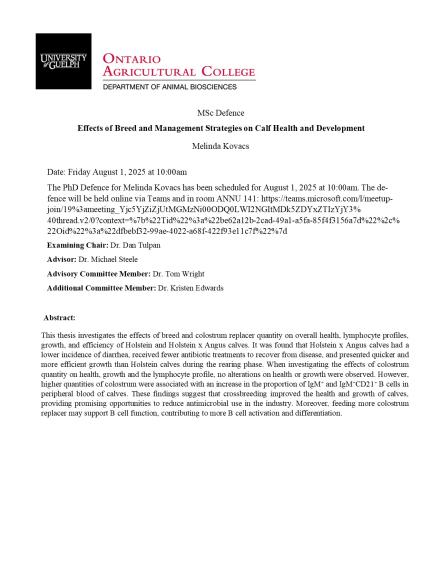The defence will be held online via Teams and in room ANNU 141: https://teams.microsoft.com/l/meetup-join/19%3ameeting_Yjc5YjZiZjUtMGMzNi00ODQ0LWI2NGItMDk5ZDYxZTIzYjY3%40thread.v2/0?context=%7b%22Tid%22%3a%22be62a12b-2cad-49a1-a5fa-85f4f3156a7d%22%2c%22Oid%22%3a%22dfbebf32-99ae-4022-a68f-422f93e11c7f%22%7d

Effects of Breed and Management Strategies on Calf Health and Development
This thesis investigates the effects of breed and colostrum replacer quantity on overall health, lymphocyte profiles, growth, and efficiency of Holstein and Holstein x Angus calves. It was found that Holstein x Angus calves had a lower incidence of diarrhea, received fewer antibiotic treatments to recover from disease, and presented quicker and more efficient growth than Holstein calves during the rearing phase. When investigating the effects of colostrum quantity on health, growth and the lymphocyte profile, no alterations on health or growth were observed. However, higher quantities of colostrum were associated with an increase in the proportion of IgM⁺ and IgM⁺CD21⁺ B cells in peripheral blood of calves. These findings suggest that crossbreeding improved the health and growth of calves, providing promising opportunities to reduce antimicrobial use in the industry. Moreover, feeding more colostrum replacer may support B cell function, contributing to more B cell activation and differentiation.

